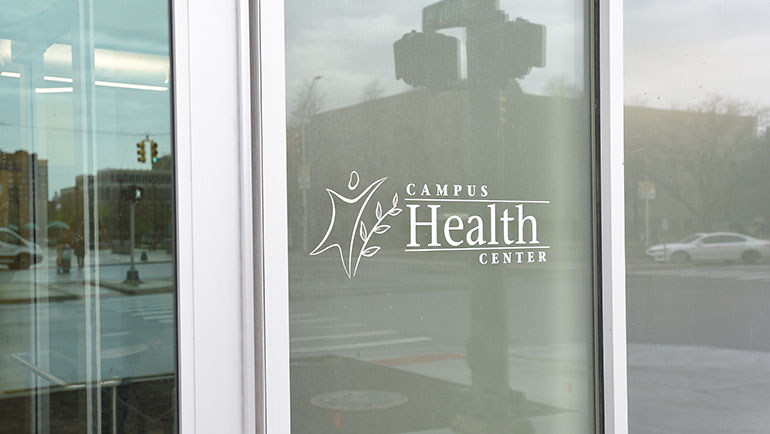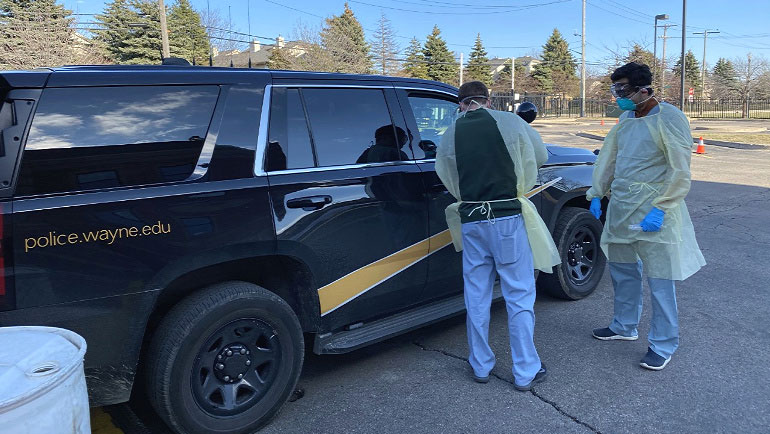Campus Health Center, College of Nursing take the lead in caring for Wayne State community during pandemic
As the COVID-19 pandemic continues to evolve, Wayne State University faculty and staff members are finding new ways to meet the changing needs of the campus community. At the heart of this effort is the Campus Health Center (CHC).
Owned and operated by the Nursing Practice Corporation (NPC), the CHC offers primary care for currently enrolled students — some of whom remain on campus.
The Campus Health Center continues to maintain regular weekday hours from 9 a.m. to 5:30 p.m. To manage daily operations, a limited number of CHC staff members are rotating as they continue to help students with everything from flu shots and immunizations to sick visits.
 Contact tracing
Contact tracing
General campus health services have become almost secondary to the novel coronavirus, though, and the CHC is responding accordingly.
“A bulk of what they are doing now is public health case-finding and case management,” said College of Nursing Associate Dean for Student Affairs Ramona Benkert, PhD, ANP-BC, FAANP, who is also a member of the NPC board.
To wit, each time a member of the Wayne State community has tested positive for COVID-19, the Campus Health Center has reached out to that individual’s university contacts to track their health and symptoms. In doing so, the CHC has made hundreds of calls to those who have potentially been exposed.
“They’re functioning like the public health department, but specifically for Wayne State employees and students,” Benkert said of the CHC.
Telemedicine
The CHC has also implemented a 24-hour answering service overseen by Chief Nursing Officer G. Lita Smith, DNP, RN, ACNP.
“After hours,” said Smith, “Our nurse practitioners have been taking phone calls to answer questions like, ‘I’ve been exposed: What do I do?’”
In an abundance of caution, the CHC is relying heavily on telemedicine to treat these patients remotely by phone or computer and help begin self-monitoring. Typically, self-monitoring involves taking one’s temperature twice a day and checking for COVID-19 symptoms. Symptoms include fever, cough, shortness of breath, sore throat, changes in taste and smell, and fatigue.
“We’ve been encouraging people [with COVID-19 symptoms] to not come in and manage them over the phone, and then follow up with phone calls over time to make sure they’re doing OK and getting better,” said Smith.
Staying healthy at home
Smith recommends following Michigan’s latest executive orders and CDC guidelines. When it comes to essential tasks that require individuals to leave home, like grocery shopping, she emphasizes the importance of wearing a mask, hygiene and social distancing.
“Wash in, and wash out,” Smith said. “Wipe the cart when you go into the grocery store and wash your hands on your way out. And try to stay six feet away from people.”
She also encourages individuals to be mindful of encounters with others in close proximity for more than 10 minutes.
“If I cross paths in the grocery store with somebody down the aisle, and I just pass them by, that shouldn’t significantly increase my risk,” Smith said, “but if I’m sitting in the cubicle with somebody three feet away the whole day and find out days later that they have COVID-19, my risk is higher. Processes have been put in place to reduce risk. Employees will be maintaining social distancing (6 feet from other co-workers) when working on campus.”
Mobile testing
The College of Nursing has also been a constant at the drive-through testing efforts in Detroit and Dearborn led by Wayne State University Physician Group, WSU Health Sciences and ACCESS as well as outreach efforts for testing at homeless shelters and nursing homes.
 “It’s been really impressive to see how many faculty [members] and students have signed up to volunteer for testing,” said Benkert. “It’s a volunteer effort — they don’t have to do that.”
“It’s been really impressive to see how many faculty [members] and students have signed up to volunteer for testing,” said Benkert. “It’s a volunteer effort — they don’t have to do that.”
She has regularly been in touch with College of Nursing volunteers, who continue to respond as the pandemic evolves.
“The whole environment has called all the resources of our nursing faculty to do clinical work, and also counsel their peers who are struggling day in and day out in the hospital,” Benkert said.
She also points out that some graduate students in the College of Nursing are doing mobile testing in lieu of their original clinical, as some hospitals aren’t allowing students to work due to limited personal protective equipment (PPE).
And when it comes to PPE, the Campus Health Center is currently accepting donations, especially for N95 medical masks. Please call 313-577-5041 for more information.
Crisis hotline
“I think we sometimes forget that the College of Nursing is half undergrads and half graduate students who are already licensed nurses who, while continuing their education, are also providing care on the front lines,” said Dean Laurie Lauzon Clabo, PhD, RN, FAAN.
And that can certainly take a toll.
“We have a large percentage of students who are out there, day to day, providing care in a variety of settings across the spectrum, and who are managing this incredibly difficult health crisis,” said Clabo, who notes that these first responders are risking exposure to a novel disease with limited therapeutics and supplies. “Then, they worry about what they bring home to their families. On top of that, they’re going to grad school — and instead of doing it in person, they’re now doing it online.”
In response to this, the College of Nursing and School of Social Work have partnered on a free, confidential crisis line. Callers remain anonymous and can find confidence in the knowledge they share with counselors, many of whom are graduate students in the psychiatric-mental health nurse practitioner program.
“It is manned by people who know what it’s like in an acute-care setting,” Clabo said of the hotline. “Folks can speak very honestly about situations that they’re experiencing.”
First responders can call or text the hotline at 1-888-910-1636 for support. Counselors are available Monday through Saturday from 5 a.m. to 9 p.m.
“It’s geared to the needs of the person who’s calling,” said Clabo. “If what I need is 10 minutes, that’s great; if what I need is an hour conversation, that’s what I’m going to get.”
Virtual learning
In any field, having to shift from in-person to remote instruction is no easy feat — but it’s nothing short of extraordinary when considering the unique challenges nursing presents.
“Our faculty have really risen to the challenge of learning how to educate students online,” said Benkert. “We’ve gone to a 100% online educational delivery mechanism, so faculty have had to learn a whole lot of new skills: how to teach, how to make things interesting in an online environment, ways to do simulated cases online without patient contact.”
Clabo, too, is quick to note that undergraduate students are actively using a COVID-19 simulation — a decidedly of-the-moment resource designed to prepare them for going into practice.
“We took that extra week of spring break to translate everything that folks have done face to face into a virtual format, and it really does feel like we didn’t miss a beat,” said Clabo. “It says something about our college community, and it’s in part why we are one of the most highly rated colleges of nursing in the country.”